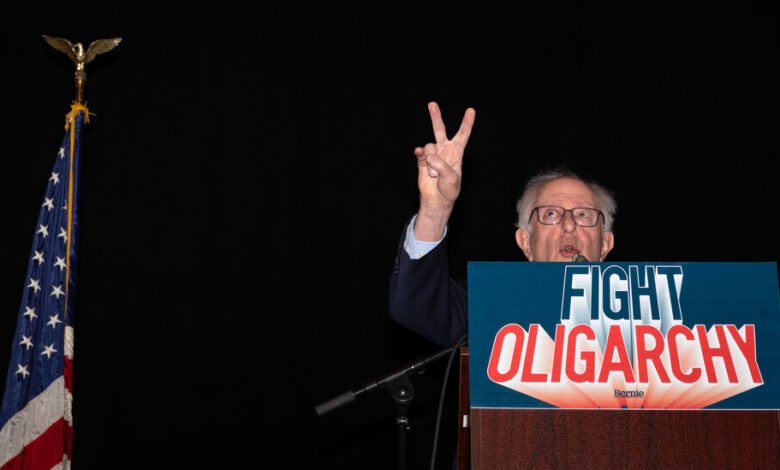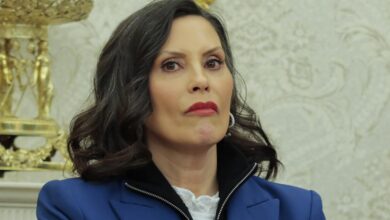Opinion | Where Oligarchy and Populism Meet

To the Editor:
Re “It’s About Ideology, Not Oligarchy,” by Ross Douthat (column, March 23):
Ross Douthat asks the right questions in this column: Why have Elon Musk and the other Silicon Valley hotshots swung hard behind President Trump? Why are they pouring money and energy into the MAGA movement? And why is Mr. Trump giving them free rein? But Mr. Douthat provides the wrong answer. It is not credible to think, as he suggests, that Mr. Musk has suddenly committed his life to lowering the deficit or shrinking the government.
We know quite well what Mr. Musk and his tech-bro pals want: to translate their tremendous wealth into power, and use that power to remake the United States into a vehicle for the endless growth of technology and, not incidentally, of their own wealth and glory. There is ideology here, an Ayn Randian glorification of the noble creators. It is an ideology that amounts to oligarchy.
Mr. Trump is seen as the vehicle for this transformation. His interests and those of the tech elite overlap, for now. Both want to fatally weaken the government and leave it open to a takeover. Mr. Trump sees himself as the new owner, while Mr. Musk and others want it run by the enlightened few. They will clash, but whoever wins, the American people will be the losers.
Adam Wasserman
Santa Fe, N.M.
To the Editor:
Ross Douthat should take his cue on oligarchy from countries where it thrives. The central characteristic of these governments is rule of (a few) men rather than rule of law. The concentration of political and economic power is typically maintained not by a coherent ideology or by policies that explicitly favor the superrich, but by identity politics that divide people into “us” and “them.”
In parts of Eastern Europe, oligarchs rely on a mixture of jingoism and ethnic nationalism fueled by external grievances and anti-immigrant and anti-L.G.B.T.Q. sentiment. These narratives justify the power of the oligarchs and maintain the system.
Across the board, the rule of law unravels because it constrains the power of the oligarchs. Is America headed in that direction?
Iavor Rangelov
London
The writer is a research fellow at the London School of Economics.
To the Editor:
Ross Douthat claims that President Trump’s policies are guided by ideology, not oligarchy. But he fails to see that Mr. Trump’s policies have an economic component — authoritarian kleptocracy. American oligarchs favor the rule of law, whereas kleptocrats want little oversight and weakened legal institutions so they can steal the country’s assets.
Oligarchs generally favor economic growth and invest in growth. Kleptocrats take what they’ve stolen from the country and invest it in real estate or luxury goods, resulting in economic decline. So, it’s not ideology versus oligarchy. It’s ideology combined with the promotion of kleptocracy.
Peter S. Wenz
Springfield, Ill.
The Cruelties of Cash Bail
To the Editor:
Re “Lost in Jail Without Charges, Lawyers or Hope” (front page, March 26):
Fernando Padron — who was jailed pretrial for months on a misdemeanor, denied a lawyer and coerced into an unfair plea deal — has a tragic story, but it’s no anomaly. His experience is a symptom of a crisis that touches every corner of the country, wherein the archaic, failed policy of cash bail punishes poverty and traps innocent people behind bars simply because they can’t afford to pay for their freedom.
Most states don’t guarantee legal counsel at a first hearing, as Mr. Padron experienced. Without a lawyer, people are more likely to have unaffordable cash bail set against them and forced to choose between prolonged pretrial detention or pleading guilty, regardless of their innocence.
Right now, more than 70 percent of people sitting in our jails are there simply because they can’t afford cash bail. That’s nearly 500,000 people ripped from their families and their livelihoods, all while legally innocent.
Our country’s jails are overcrowded, expensive and destabilizing. Our resources should be focused on detaining those who pose a real threat — not those who simply lack money.
It’s time to end the criminalization of poverty. Freedom should be free. It’s common sense, and it’s smart policy.
Devin McMahon
Los Angeles
The writer is the manager of communications at the Bail Project.




